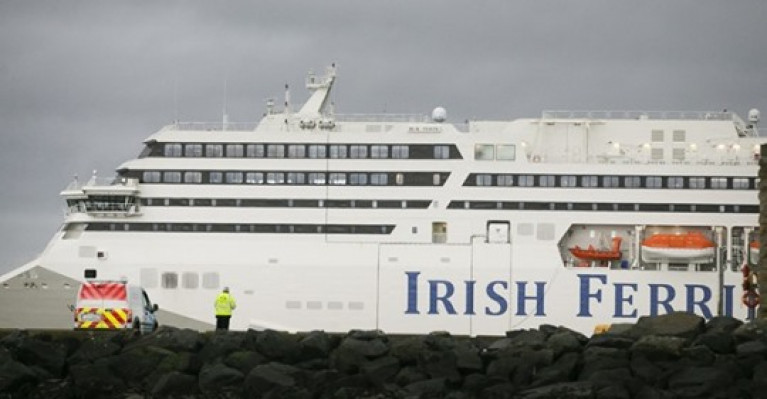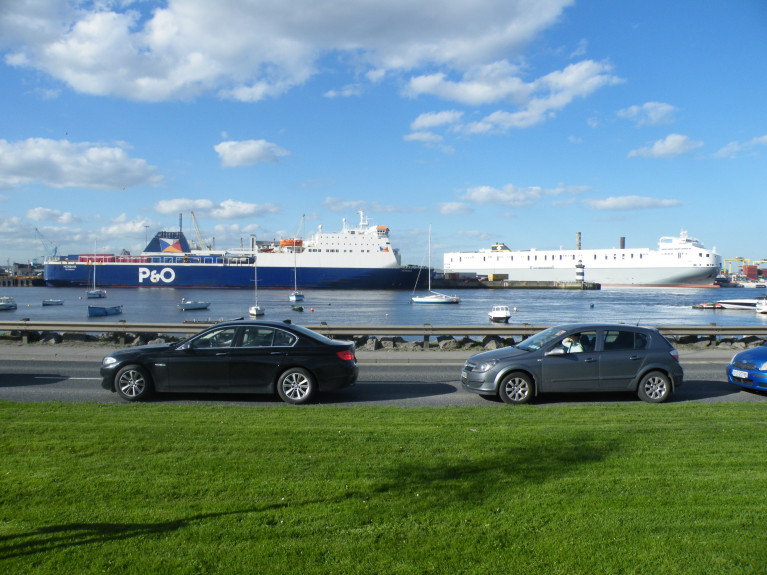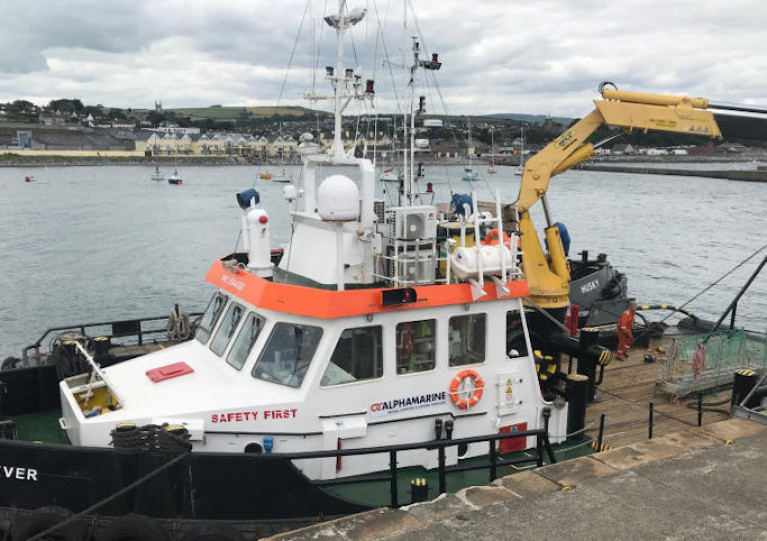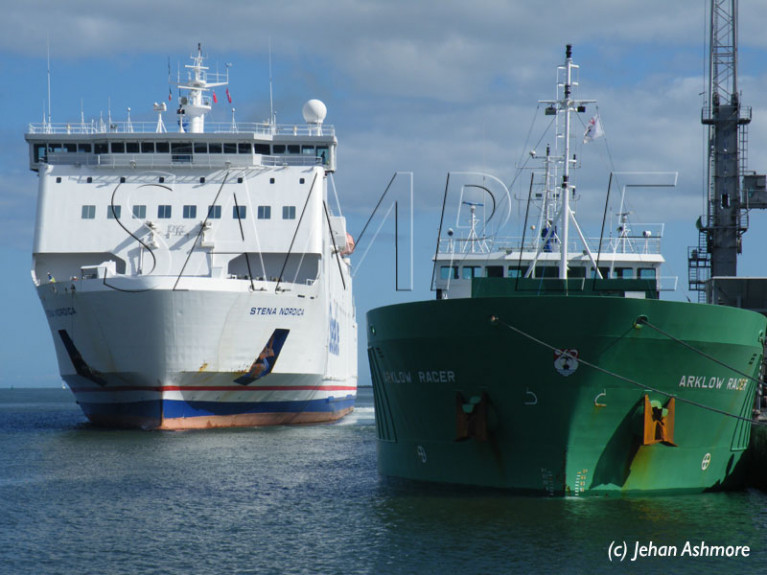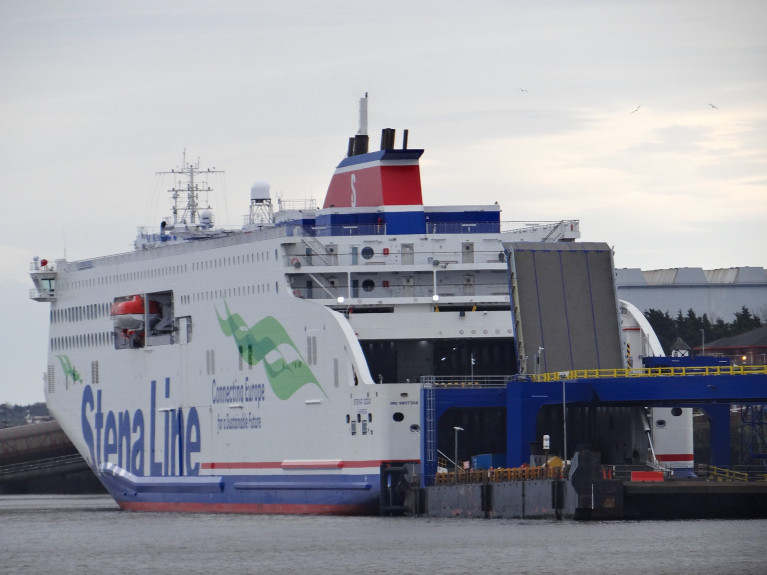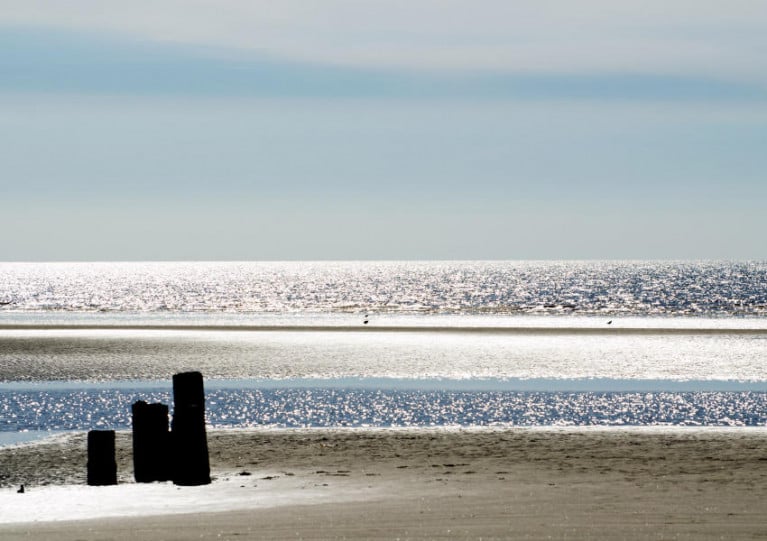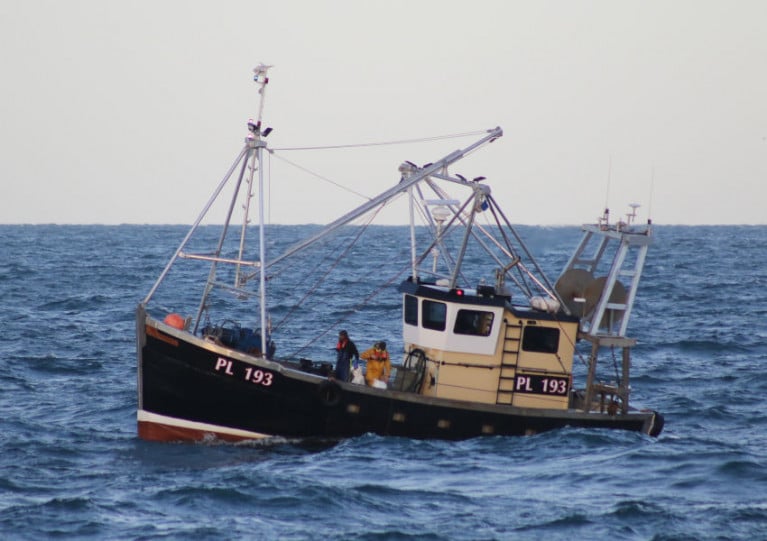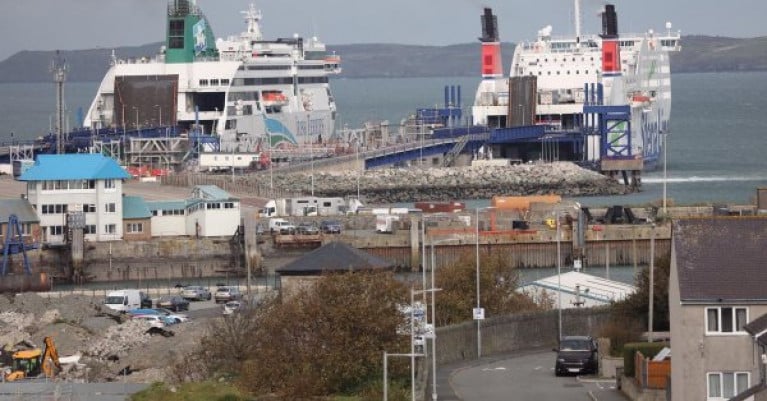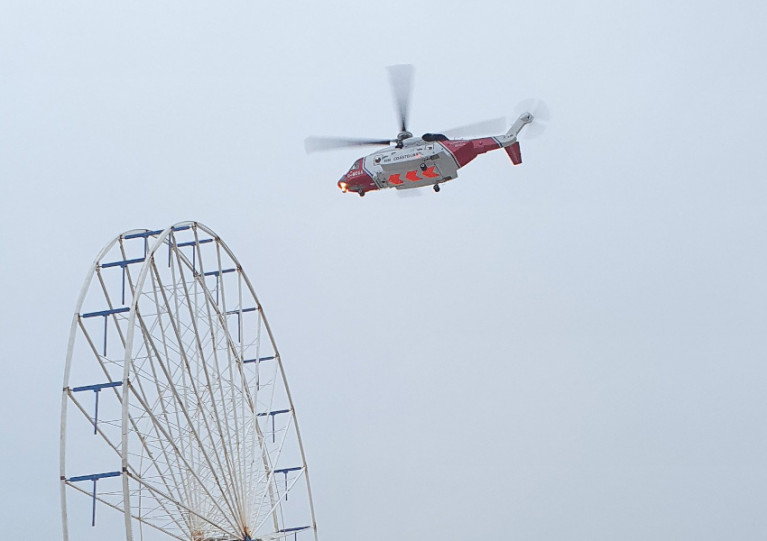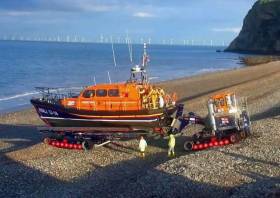Displaying items by tag: irish sea
Ferry Crew Member Missing after Overnight Search in Irish Sea
A ferry crew member from an Irish Ferries passenger ship remains missing after a failed search attempt in the Irish Sea overnight.
The WB Yeats ferry operates the Dublin to Holyhead route. The alarm was raised at around 9pm yesterday.
The search is being overseen by the HM Coastguard in Holyhead in Wales, but the Irish Coast Guard is providing assistance.
For more on this incident consult the TheJournal.ie here.
Brexit: Johnson Claims of EU ‘Blockade’ in Irish Sea Rubbished in Dublin
Government members at senior level have rejected claims from UK prime minister Boris Johnson that the EU is seeking to impose a blockade in the Irish Sea after Brexit.
Taoiseach Micheál Martin said another of Mr Johnson’s claims – that he needed to dismantle parts of the withdrawal agreement he reached with the EU in order to “stop a foreign power from breaking up” the UK – were “not the case and he knows well that’s not the case”.
Mr Johnson wrote in the Daily Telegraph on Saturday that the EU was threatening to impose a food “blockade” in the Irish Sea that would destroy the “economic and territorial integrity of the UK”.
This was a reference to the need for the UK to outline its future food standards regime to the EU before being granted permission to export to the bloc.
Minister for Foreign Affairs Simon Coveney dismissed Mr Johnson’s claims as “totally bogus” and “absolutely not true”. He said the UK was damaging its international reputation and he criticised as “spin” Mr Johnson’s claim about a blockade between Britain and Northern Ireland.
Further reading from the Irish Times here.
Deployment Of Wave Monitoring Devices Off Wicklow Coast
Metocean devices will be deployed in the Irish Sea off the Wicklow coast) in the coming days, weather permitting, to provide environmental data for the development of the Arklow Bank Wind Park.
Similar to last autumn’s deployment, four separate devices to monitor waves and currents will be deployed, which will include a seabed frame with the sensors mounted on it, an anchoring system, and a surface marker buoy.
The devices will be deployed using either the AMS Retriever (Callsign MEHI8) or Husky (Callsign 2EQI7), both versatile multi-purpose shallow draft tugs. The devices will remain in place for approximately six months, serviced on a three-monthly basis.
During deployment and recovery operations, the AMS vessel will be restricted in its ability to manoeuvre. The devices will be located using yellow special mark buoys which will have the relevant markers and ATON characters.
The location of the devices will be off the Wicklow coastline as detailed in Marine Notice No 31 of 2020, which is available to download below.
Ship Sample 1 of 2: Stena Ferry Continues its 'Nomadic' Role in These Challenging Times
Stena Nordica continues in nomadic mode as Afloat tracked the ropax ferry on a repositioning passage to Fishguard, having relieved duties of former engine troubled newbuild Stena Estrid which returned to the Holyhead-Dublin route today, writes Jehan Ashmore.
The leadship of Stena's E-Flexer class Chinese newbuilds, had problems with the ship's German built engines, which led to repairs following arrival in early May at Cairnryan (Loch Ryan Port). From Scotland, the Stena Estrid made last night a repositioning passage through the Irish Sea to Wales so to resume service from Holyhead with this morning's sailing.
Among measures from today, face coverings are recommended for all passengers and crew on Stena Line vessels (etc), in terminals, and on the company's routes on the Irish Sea and the North Channel where social distancing is difficult to achieve, such as in stairwells, lifts and in corridors.
The final sailings on the Dublin-Holyhead route undertaken by Stena Nordica involved sailings last night before returning to Wales this morning and off again on a repositioning passage from Anglesey to Fishguard. But before more on the Stena Nordica's departure, it should be recalled that the Japanese built ropax was also a routine ferry working on the central Irish Sea route in tandem with existing ferry Stena Adventurer, until replaced by Stena Superfast X in 2015 (see: below DFDS Malo Seaways) and Stena Estrid entering earlier this year.
As for the 'Superfast' series ship is to embark on a new career with Corsica Linea sailing in the Meditteranean Sea but not between France and Algeria in north Africa as originally planned. Due to Covid19, the renamed A Nepita will aptly first serve Corsica on the Marseille-Bastia and Marseille-Ajaccio routes.
Returning to Fishguard where once again Stena Nordica will be on relief duties at the Pembrokeshire port so to enable the routine ferry to Rosslare, Stena Europe head for annual dry-docking at Harland & Wolff, Belfast. After Afloat tracked Stena Nordica this morning the ropax was later caught up at the south Wales port with a lunchtime arrival, however the first relief sailing won't be until tomorrow and at the same time.
These deployments are no way novel, as Stena Nordica has served the Swedish based operator on many a route across the Stena Line network. Mostly involving such duties over the years on the Irish Sea, following a debut for Stena but beginning in Scandinavia. This was in a more settled role when the ferry was a routine ship on the Karlscrona, Sweden-Gdynia, Poland route.
Prior to the debut on the Baltic route, the ropax had been named European Ambassador for client, P&O Irish Sea which also placed an order for a pair of smaller half-sisters likewise built in Japan to serve the Irish Sea. The pair European Causeway and European Highlander, whose names aptly reflect the geographically locations either side of the North Channel route of Larne-Cairnryan remain in service. With competing Stena Line based at their nearby custom built terminal officially named Loch Ryan Port when opened in 2011 following closure of Stranraer.
As for the suffix of 'Ambassador' perhaps something to do with operating on the Irish Sea, given the ferry first served between Dublin and Liverpool, in north-west England. So when P&O introduced the ropax the famous ferry brand then was split under various company names to reflect the region of operations, hence P&O (Irish Sea) Ltd. Due to the 'Nordica's extensive nomadic career, Afloat has concentrated just on Irish related highlights, though in between times at Holyhead, the ropax in 2015 was chartered to DFDS Dover-Calais service as renamed Malo Seaways (See: Deal or No Deal /Ferry & Irish Cargoship).
As for the European Ambassador's service linking the Liffey and Merseyside this did not last long, as P&O also briefly relocated from the UK port to Mostyn in north Wales, where earlier this year, Norbank undertook berthing trials due to the backdrop of a dispute of port fees in Liverpool (Peel Ports Group). This was resolved with the service still in place on the central Irish Sea route connecting the Irish capital with the city of Liverpool.
It was during the use of Mostyn on the Dee estuary shared with the Wirral Peninsula in England, that P&O (Irish Sea) also ran European Ambassador on another route after calling to Dublin but this involved beyond the Irish Sea. This other route connected the Irish capital with Cherbourg, France, though the weekend only summer service linking to mainland Europe only lasted two seasons before Mostyn in 2003 was abandoned with P&O returning to Liverpool.
P&O (Irish Sea) where the first ferry operator to launch the direct Dublin-France service by calling to Cherbourg, the Normandy port is particularly familar with various routes and operators to and from Ireland over the decades. The latest example been the reopening of the Dublin-Cherbourg route which Irish Ferries launched in 2014 using the chartered ropax Epsilon which recently returned to their Dublin-Holyhead service in competition with Stena.
Taking place of the ropax on the Ireland-France route is W.B. Yeats, which resumed 'cruiseferry' operated sailings for the summer months. Due to Covid19, these sailings were delayed severly by almost three months.
From the onset W.B. Yeats was built to operate the Dublin-Cherbourg route (and Holyhead in winter), though ultimately at the expense of abandoning Rosslare Europort where Irish Ferries operated Oscar Wilde to Cherbourg. In addition the summer high-season Roscoff route with shorter sailing times.
The operator faced criticism yet cited the reason for the withdrawal from Rosslare was because that what customers wanted given the convenience of Dublin Port and demand of freight hauliers. However, this was not the case for those residing or operating business in the south-east and from the neighbouring region of Munster.
As Afloat reported yesterday, ferry bosses ruled out increasing Ireland-France summer sailings, despite pressures of Covid19 social distancing measures impacting ferry capacities. In addition to speculation of a boost as people avoid aviation travel and instead take to the seas.
The absence of Irish Ferries was keenly felt in Rosslare albeit with Stena operating to Cherbourg. Things were to change earlier this year when Brittany Ferries strategically filled the void by abandoning the Cork-Santander route and replaced with the Rosslare-Bilbao link. This is the 'Europort's first 'direct' service to Spain. Unlike the longer operating LD Lines, which among its network had an 'in-direct' link from Rosslare to Spain via St. Nazaire, France and onward sailing across the Bay of Biscay to Gijon in northern Iberia.
Also Brittany Ferries first use of Rosslare will see the resumption of the Roscoff route which the operator will run on an économie' branded basis.
When Stena Nordica takes over the roster of Stena Europe in Fishguard, with a scheduled afternoon crossing to Rosslare, the ropax's arrival will be far from been a stranger but a familiar sight in the Wexford ferryport.
As last year Stena Nordica spent some six months on the southern corridor while Stena Europe went to Asia when dry-docking in Turkey. An extensive mid-life refit was however delayed on the veteran vessel dating to 1981. However despite been the oldest ferry on the Irish Sea, Stena's investment and commitment of the ship is to see the ferry remain for more years on the St. Georges Channel link.
It was during previous P&O (Irish Sea) times when European Ambassador sailing on the Dublin-Cherbourg route would make en-route calls to Rosslare but only occasionally as such stopovers was dictated by freight demand. This made the route all the more fascinating but also a boost for the south-eastern 'Europort' the closest Irish port to our nearest continent.
In the final year of the Dublin-Cherbourg seasonal service that ended in 2003, P&O decided to open up the Ireland-France route to 'foot' passengers, an opportunity that was personally seized upon. The inaugural sailing of this type took place over a St. Patrick's Day bank holiday weekend, with the ferry departing notably from within Alexandra Basin and passing at close quarters the lighthouse at the end of the North Wall Quay Extension. All this making it novel compared to the other terminals in the port downriver.
An another added bonus on board European Ambassador in P&O's famous livery of the funnel's flowing flag, was to sail along Leinster's eastern seaboard. This is where among the coastal sights is scenic Dublin Bay and the Wicklow Mountains. Such scenery no doubt welcomed by those also travelling from mainland Europe.
Such a vista is now available with W.B. Yeats and in cruiseferry comfort plus with the knowledge and benefit of the ship's emission 'scrubbers', following an EU Sulphur Directive to cut down on harmful pollutants. The directive to have scrubbers installed came into effect on and after 1st January this year.
UK government rules out any new customs infrastructure at ports on either side of the Irish Sea to implement the post-Brexit Northern Ireland protocol.
In a paper outlining how it will implement the protocol, which was agreed alongside the withdrawal agreement last year, the government also said there would be no requirement for export declarations for goods moving from the North to Great Britain.
“At the heart of our proposals is a consensual, pragmatic approach that will protect the Belfast (Good Friday) Agreement and the huge gains from the peace process. Implementing the protocol in this way will ensure we can support businesses and citizens, and protect Northern Ireland’s place in the UK’s customs territory, while upholding our commitments to the EU’s Single Market.
“Northern Ireland will benefit fully from its access to the UK and EU markets. The whole of the United Kingdom will be able to capitalise on the opportunities that will come from forging our own path and striking new free trade agreements with countries around the world,” cabinet office minister Michael Gove said.
For further details of the protocol The Irish Times reports here.
Irish Sea Marine Life Conservation Gets Funding Boost In UK
Three wildlife trusts in the north-east of England have been boosted with a £300,000 (€345,000) award from a major grantmaking charity for efforts to protect marine wildlife and habitats in the Irish Sea.
As the Chester Standard reports, the Esmée Fairbairn Foundation has given the five-year grant to fund staff carrying out marine policy work and promotion in the north-west region and the wider Irish Sea.
“The funding will enable us to continue our work to protect and lobby for Marine Protected Areas as well as raise awareness about issues affecting our marine life and champion the sustainable management of our seas,” said Martin Varley, operations director with the Cheshire Wildlife Trust.
The grant will also support collaborative work with fellow wildlife trusts in Lancashire and Cumbria, which have already secured public and political support for the designation of 10 Marine Conservation Zones in the Irish Sea.
The Cheshire Standard has much more on the story HERE.
RNLI fishing safety manager Frankie Horne has urged the fishing community to avail of safety training that is on offer for their crews and to ensure that their safety equipment is up to date.
It comes after the skipper of a fishing vessel that sank late last year off the Isle of Man has attributed their rescue to the safety training the crew had undertaken previously and to their lifejackets, which were fitted with personal locator beacons (PLBs).
On the evening of 23 November last year, the fishing vessel Polaris suffered a catastrophic hull failure in the Irish Sea off the west coast of the Isle of Man.
The vessel sank so rapidly that the skipper only had time to send out a Mayday to the coastguard and other surrounding fishing boats before the vessel became submerged.
The coastguard immediately launched two RNLI lifeboats, from Port St Mary and Port Erin, and a rescue helicopter. However, it was a local fishing vessel, Lynn Marie, which arrived first on scene.
The skipper and a crew member from Polaris had been in the water for at least 15-20 minutes before help arrived.
The skipper of the Lynn Marie feared the worst on arriving at the scene as the Polaris had already gone below the water. The skipper stopped his engine to listen for the crew of the Polaris, which proved a wise decision as he heard two men in the water shouting. The Lynn Marie crew located them with a search light and recovered them from the water.
‘I can tell you that there is no doubt that the lifejackets saved our lives’
Commenting on the rescue, Horne said: “After speaking with Gordon Mills, the skipper of the Polaris, and the crew of Lynn Marie on their arrival at Peel, it was quite clear that this could have been a very different story had the crew of both vessels not acted so professionally.
“The crew had attended safety training and wore lifejackets fitted with personal locator beacons which had increased their chances of survival.”
Gordon Mills, skipper of Polaris, added: “At no time did I feel our lives were in danger due to our training and equipment.
“We had a policy of wearing lifejackets on the working deck since attending refresher training, where I was shown a film involving fishermen wearing their normal working clothes, being put through their paces in the RNLI Survival Centre Environmental Pool, both with and without lifejackets in cold water with wave movement whilst attempting to recover themselves.”
Mills added: “To see fishermen struggling in a controlled environment and only lasting a few minutes or in some cases a few seconds without the lifejacket makes you think about your own safety.
“I can tell you that there is no doubt that the lifejackets saved our lives. We wouldn’t have even been afloat for the crew of fishing vessel Lynn Marie to recover us from the water had we not been wearing them.
“I would encourage all fishermen to start wearing their lifejackets while on deck — you just never know when you might need it.”
Plans for Brexit Checks At Irish Sea Ferry Ports
On the Irish Sea the biggest ferry operator in this market area has confirmed that there will be checks, inspections and some new infrastructure for trade, and it wants to know what the UK government will pay for.
The plans, according to BBC News, will affect both trade with the Republic of Ireland and within the UK between Great Britain and Northern Ireland, as a result of Brexit.
Stena Line said that its working assumption was that new checks would be carried out in British ports.
Stena boss Ian Hampton told the BBC that though a managed exit was "positive" and the extent of new procedures could be lessened with a strong deal, "there's a border, and the border requires checks".
The border will be down the Irish sea, he said. And while his company won't be doing them, it will have to provide room for officials to do the checks, he said.
As well as operating a fleet of ferries connecting Great Britain to the island of Ireland, Stena also owns three ports on the route, and wants to know the physical changes required on what has, until now, been seamless trade.
The industry's assumption is that the checks will be done in Great Britain on exit rather than in Ireland or Northern Ireland.
For much more on trading relationships including those on the North Channel routes click here.
Angler Feared Missing In Irish Sea Walks Into Blackpool Bait Shop Unaware Of Search
An angler from Blackpool learned he was the subject of a nine-hour search and rescue operation only after being told about the incident by an employee at a bait shop in the Lancashire town, as the Blackpool Gazette reports.
It’s understood that the man gave a statement to police after his discussion with shop workers at Blackpool Angling Centre revealed he was likely the person at the centre of a major emergency operation launched two days previously, on Thursday 2 January.
The man — who had been angling at Blackpool’s South Pier when he says he got into difficulty with his fishing gear — is believed to be new to the area and “genuinely didn’t know there was a full scale search for him”, according to a spokesperson for the shop.
The Blackpool Gazette has more on the story HERE.
Searches Resume For Light Aircraft Missing Over Irish Sea Off North Wales
Searches for a light aircraft that went missing between the Irish Sea and the Menai Strait off North Wales yesterday afternoon (Monday 25 November) were suspended overnight.
The aircraft, with one person on board, reportedly disappeared from radar near Puffin Island off Anglesey at lunchtime yesterday.
This prompted a major search operation that involved HM Coastguard teams from Penmon and Bangor, the coastguard helicopter from Caernarfon and RNLI lifeboats from Beaumaris, Moelfre and Llandudno.
Searches were set to resume this morning in an area around Penmon, on the opposite side of Anglesey from Holyhead.



























